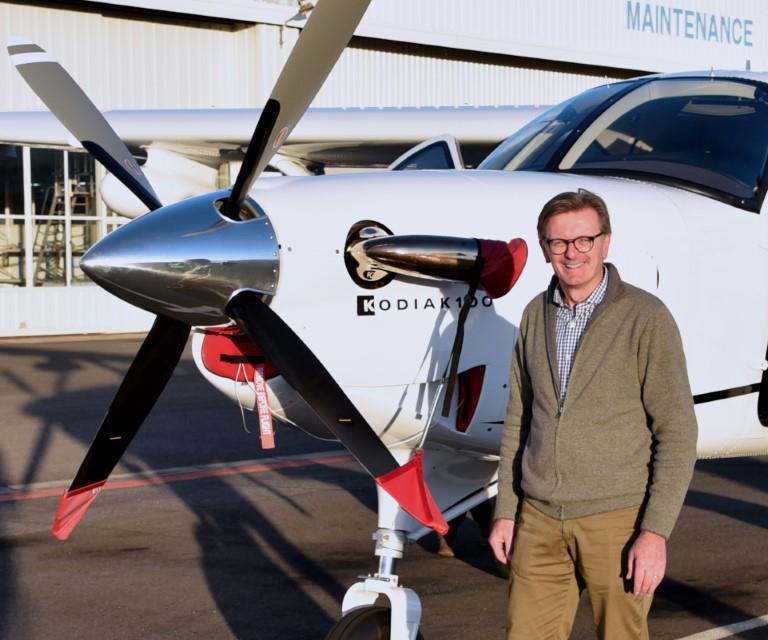
Daher Senior Vice President for Aircraft Nicolas Chabbert.
Nicolas Chabbert is senior vice president for aircraft with French manufacturer Daher. He spoke with ShowNews in advance of NBAA-BACE.
Daher introduced its latest-generation TBM 960 single turboprop with PT6E-66XT engine at the Sun ‘n Fun conference in April 2022. How have the sales been, and what trends do you see in the turboprop market?
Although we only started to ship the airplane by the end of June 2022 after we got validation from the FAA, sales have been very good. I’d say it varies over time depending on when you ask me the question, but we [speak of] two years’ worth of order book, and that has been pretty constant for the last two years. Basically, the good news is that we were not only filling up the order book for two years, but we have enjoyed that all of those sales have been to retail customers—they weren’t distributors ordering—they were retail customers.
The turboprop market is kind of cooling off. It is kind of slowly transitioning to normalizing. It is [still] at an incredibly high level, but now the ordering by retail buyers is a little less than it was a year and a half ago, although [orders] remain very high. We will see how profound [the trend] is in two years with retail buyers.
Daher’s TBM 940 was one of the first aircraft certified with Garmin’s Autoland system in 2020, and the TBM 960 also comes with Autoland capability, which Daher calls HomeSafe. How do you see business aircraft technology evolving until 2035?
HomeSafe is an example of a great idea that Garmin put out, which is probably working at the utmost possibility on the TBM 960 because you have control over the entire chain of systems. You have a complete digital chain, and Autoland is able to fly the airplane virtually [on its own]. We are limited by regulation that only wants us to use it as a last resort as an emergency system.
The introduction of tailored management of the engine that we’ve just made with the PT6E-66XT is another example [where] we could drive different modes of use of the power, which could answer some of the questions that we have about environmental sustainability. Before, we had to define the management of the engine only on performance criteria. Today, we can customize it to the market.
The EcoPulse demonstrator aircraft (a modified Daher TBM 900), made its public debut at this year's Paris Air Show in June. Flight tests of the hybrid-electric powertrain were due to begin later in the summer. What is the status of the EcoPulse program with Safran and Airbus?
This partnership is going very well. The test campaign has continued after summer with a lot of ground tests [in Tarbes, France]. What we are about to do is have a full electric flight demonstration, which has not yet happened. There is a calendar of events—there is a commitment to make it happen. Daher, Airbus and Safran are conscious that we are going to open up the technology field, but not at any price of safety.
Given the slow ramp-up in production of sustainable aviation fuel (SAF), and the fact several industries compete for sustainable fuels, is it reasonable for business aviation to bet on heavily using SAF in future?
The answer to the question, in short, is absolutely. The question is how—it’s not about what and why. ReFuelEU has actually started to pass legislation with some goals that have been established for 2025, 2030, 2035—all the way to 2050—for alternative fuel and introducing the components of synthetic fuel. I believe that Europe is in a good position in that respect. I also believe that in the U.S. there will be initiatives to mandate the use of SAF as an entire blend in a system, that the entire fuel that is consumed is going to be blended to a new objective. I believe that’s the path to getting the petroleum industry on board.
Daher acquired Quest Aircraft Co. in 2019 and now builds Kodiak 100/900 series utility aircraft in Sandpoint, Idaho. What’s new at Kodiak, and how has the integration with Daher progressed?
Like any integration, we have some bumps and ups and downs, but I think it’s going extremely well. We have more and more common processes between what we have been using at Daher, and slowly Kodiak is adopting them. Now, you have to consider that this industry is in a very difficult situation with the supply chain shortage. We have to fight every day, so we are late with our customer deliveries. But I think the integration has been definitely the best thing for Kodiak. I don’t believe [Quest] would have survived COVID and post-COVID if it was not with Daher. Lastly, I would say that we also have made some very important investments, so now we have a fully integrated production system.





